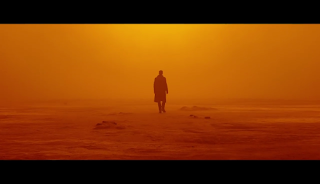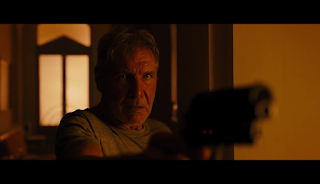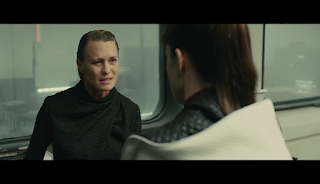Here we go again...
10 Films of 2017 That I Didn't See
The Lego Batman Movie
I haven't seen the Lego Movie, so, perhaps absurdly, I felt like I shouldn't watch this until after I'd seen that. Update: I've seen it now. While not as funny as the Lego Movie from which it spun off, the voice performances are great, particularly from Will Arnett, Zach Galifinakis and Michael Cera, and the character-driven story makes a surprisingly pithy observation about loners who claim to feel nothing and need nobody. It's not really a Batman film, just a comedy about characters based on the Batman characters, but even so it's still the best film to feature him since The Dark Knight.
Logan
Given that I actually liked X-Men: Days of Future Past I should probably watch this as well.
Beauty and the Beast
No one appears in a film like 1991 animated Gaston. Couldn't be bothered with a live action do-over, despite, like many lads who grew up in the early 2000s, having a soft spot for Emma Watson.
Kong: Skull Island
More like Kong: Skullf*ck Island, amirite?
Baby Driver
Edgar Wright hasn't done anything good since Hot Fuzz.
Alien: Covenant
After Prometheus? Good god, no.
Pirates of the Caribbean: Dead Men Tell No Tales
Despite being slightly tempted by the prospect of seeing Paul McCartney completely fail to act, and somewhat enjoying On Stranger Tides, I was totally put off by a) Johnny Depp these days, and b) the title being too similar to that of the second film, which is just lazy.
It
I haven't read the book (or indeed any Stephen King) so I feel like seeing the film would just be like seeing what it is, a film adaptation of a very long and complex novel. Why bother?
I, Tonya
I should probably see this, if only so I can compare it to Weird Al's music video for "Headline News".
The Shape of Water
I should probably see this too.
13 Films of 2017 I Have Seen:
Get Out
It was good. Is that a trite opinion now? The uncomfortable atmosphere and ludicrous, but satirically effective, sci-fi premise make it striking and memorable. Daniel Kaluuya's performance is pretty spot-on; personally I found it all rather gripping, but I think retroactively it was oversold to people, affecting its impact. The hypnotic abyss he's sent to is vividly realised, and the auction scene is absolutely haunting. Furthermore, it's nice to see him get his revenge on all these lunatics as the film continues. Besides, it's got that song Redbone in it that everyone loves, so surely it's all good.
The Blackcoat's Daughter aka February
Another horror film, this one was also tense, atmospheric and chilling. Its representation of the alienation and disaffection of young people represented through what could either be mental illness or genuine devil-worship is rather grisly and morbidly fascinating to watch. It's memorably lit and coloured as well in harsh whites, greys and blacks, adding to the sense of isolation and unease. Perhaps its only weakness is the narrative conceit concerning Kat and "Joan", because Kiernan Shipka and Emma Roberts just don't look that alike. Like a film I similarly appreciated with comparable elements, The Witch, it leaves plenty to the imagination: was she genuinely in contact with a malevolent intelligence, or was she just insane? This is the kind of thing that makes for good horror in my view.
Guardians of the Galaxy, Vol. 2
This is a pretty strong sequel to the first film, functioning well as a character study for virtually all of the main cast, including some new ones. Mantis is a welcome addition to the team and it handles the stories of Star-Lord, Gamora, Rocket, Nebula and Yandu deftly, which speaks a lot to James Gunn's talent as a writer as well as a director. Drax, my personal favourite of the Guardians, is in more of a support role here, but his friendship with Mantis makes it worthwhile. The villain, Kurt Russell's Ego (no pun intended), has a reasonable if slightly rushed motivation. I only have two criticisms of this film. The first is that I think it slightly lacks the same spirit of adventure as the first film. The other is that the final battle in Ego's core is an over-long, weightless CGI nothing-fest, the kind of thing that bores me to tears rather than exciting me. Other than that, it's a solid space opera outing. If it wasn't for the excess of CGI, these films would actually have a chance of being worthy modern equivalents of Star Wars in some respects.
Wonder Woman
The best film in DC's current franchise by a staggering margin, Wonder Woman proves what's been eluding Warner Bros. all along: that if you actually let creative people with an interest and an appropriate vision (so not Zach Snyder) do their jobs and don't constantly interfere with them you might actually get something good. Gal Gadot, despite a shaky start in Batman v Superman, brings a great deal of strength and heart to the role of Diana, while Chris Pine provides admirable support as Steve Trevor. The First World War setting is interesting and well-utilised, positioning itself right at the end of the conflict to give the film an appropriately apocalyptic feeling. I do have a few issues with the film. I think it's slightly too long; I think it's weird that they represent the real-life Ludendorff as a supervillain when, despite being a co-military-dictator, he was really just a little fat man with a moustache; David Thewlis doesn't make for a terribly effective villain either; the female villain, Dr Poison, is surprisingly forgettable in an otherwise strongly woman-led film; and the final battle between Diana and Ares is another meaningless CGI dust-up with no weight to it. Otherwise, I liked it and it's frustrating the other DC films can't emulate it. Give the director's chair to Patty Jenkins for the next Justice League or whatever.
Spider-Man: Homecoming
I struggled to get into this one. Tom Holland is good as Spider-Man, and he feels like the best onscreen version of the character of the post-2000 adaptations, but the film itself felt off to me. I realise that they didn't just want to do the same old shit as Sam Raimi's films and those godawful Amazing Spider-Man ones with the Manhattan setting, crazy supervillain with some over-the-top plan and/or obession with Spider-Man, and so on, but sometimes it just didn't feel that much like Spider-Man to me. Then again, what do I know about Spider-Man? As with all Marvel Cinematic Universe stuff these days there was too much Tony Stark as Iron Man, I found the whole sequence in Washington DC weirdly out of place, and the bit where Spider-Man's trapped in the underground warehouse or whatever was just tedious. On the other hand, I liked Michael Keaton as the Vulture, his character development, and the fact that he had a pretty down-to-earth motivation. That twist in which he turns out to be Liz's father got me as well. An okay film, but I just feel like it's missing something. I wouldn't mind rewatching it.
A Ghost Story
I only just watched this, but it's a very touching thing. A representation of how we become attached to places and people, often without really knowing why, it manages to be bittersweet, poignant and successful at capturing a sense of the mysteriousness of life and reality while the main character is a silent man in a bedsheet with two eyeholes cut in it. It has an excellent soundtrack and long, lingering shots which ask us to contemplate and meditate, filling the space with our own moods and thoughts, reflecting on ourselves. I'm pretty sure the guy at the party with the beard is not expressing the film's own argument, but rather something we're meant to see as wrong; it doesn't matter if entropy and decay doom our works to eventual nothingness. What value can we have beyond that which we produce in our relationships with the people around us, and for a little while after us? It's fundamentally a triumph of existentialism over nihilism, a differentiation so easily misunderstood in the modern day. Plus it has five minutes of Rooney Mara eating a really gross-looking chocolate pie. I absurdly saw this at the shop today in the horror section. I assume whoever was stocking the shelves hasn't watched it.
Dunkirk
Christopher Nolan's much-lauded tension-fest, this atmospheric Second World War film is suspenseful almost to a fault, to the point at which I suspect an element of realism may have been lost, although realism was probably never the point. The practical effects used to represent the air combat, however, are hugely welcome, and if the film at times is predictable, and it loses something in featuring too many of Nolan's regulars, it's still of the same high standard as any Nolan film I've seen (apart from The Dark Knight Rises, that sucked). That's the thing about Nolan, though: he's like a "premium package" kind of director, who makes extremely, exceedingly well-crafted films, but doesn't necessarily make films of great artistic genius with any consistency, if at all. Maybe that's not what he's after.
Annabelle: Creation
It's crap. Read my full review here.
Darkest Hour
Gary Oldman's Oscar-winning performance as Winston Churchill is definitely engaging, as is the film as a whole, but despite its efforts to make Churchill a rounded character the film almost inevitably comes across as hagiographic, depicting Churchill as fundamentally a good man with a few minor character flaws. In reality, as the cliché goes, people are much more complicated. Churchill may well have been the only man in the party with the conviction to stand up to Hitler, but the film tries to present him as being, or developing into, a loveable man of the people when in reality he was a racist snob for whom the war was ultimately not about saving democracy but rather leveraging Britain's ongoing geopolitical influence in Europe. I'm not saying Churchill wasn't a great man of conviction and purpose for standing up to Germany when everyone around him was succumbing to defeatism, but couldn't the portrait be a little more balanced? Regardless, purely as a piece of cinema, it's well-made and entertaining, with only the Tube scene really standing out as something schmaltzy and reeking of wishful thinking.
Blade Runner 2049
A nice-looking and largely thought-provoking science fiction film in its own right, its greatest weakness ultimately derives from presenting itself as a sequel to the timeless, inimitable original. The first half or two thirds of the film is actually a good deal more engrossing than anything that happens after Harrison Ford shows up and the film becomes obsessed with the absent Rachel. You can read or, if you prefer, listen to my full review here.
Thor: Ragnarok
In my view, this is absolutely the best Marvel superhero film in years, probably since the first Guardians of the Galaxy. Its greatest success is in not taking itself particularly seriously, with a great deal of humour, an energetic soundtrack courtesy of Mark Mothersbaugh, and lavish visuals. Like all of these superhero films it does inevitably suffer from excess of CGI, but the humour and storytelling in my view largely make up for it. Unfortunately, the film grinds to a halt every time it cuts back to Asgard and Cate Blanchett hamming it up as Hela, which lacks the humour and visual style of the rest of the film; seeing Thor's friends get massacred, for instance, is almost too bleak compared to what happens elsewhere. Nonetheless, Chris Hemsworth, Tom Hiddleston, Mark Ruffalo and Tessa Thompson are all on fine form, especially considering how many of these Hemsworth and Hiddleston have done. I actually enjoyed the idea that Asgard is a people, rather than a place (it's more set up in the film than you might think), Odin gets a nice sendoff, and the method of defeating Hela by exploiting Surtur to destroy the planet was a nice twist, I thought. Jeff Goldblum's good too. Can you tell I like this film?
Justice League
It sucked, everyone knew it was going to suck, it was always going to suck, it sucked. I actually kind of liked it because it was so stupid, but the villain is incredibly boring, Ben Affleck has already given up on being Batman after the last debacle, Wonder Woman doesn't have enough to do despite being in such a successful precursor, and Aquaman feels as pointless as the stereotype portrays him as being. The only vaguely successful new(ish) character is the Flash; Cyborg is totally forgettable. No one really seems to care about how ghoulish and Frankensteinian the resurrection of Superman is either. I honestly feel sorry for everyone involved in this, but if you want mindless superhero camp it kind of does its job.
Star Wars: The Last Jedi
As I've said a thousand times, it's an unbelievably frustratingly flawed film with some incredibly good, very strong elements. Rey, Luke and Kylo equals interesting. Poe, Finn and Rose equals clumsy and distracting. As much as I think the film's biggest and loudest detractors come across as either frothing pop-culture obsessives or sinister political culture warriors, I can't help but feel that Rian Johnson should have just made more of a crowd pleaser, although it's the media's fault for making idiots think that Snoke's identity and Rey's parents were important. Read my full review here, my article on why Snoke doesn't matter here, my article on why Rey was right to not join Kylo here, my article on Luke's characterisation here and my article on the film's theme of nonviolence here.
Best Film of 2017?
Probably A Ghost Story which I reviewed above, in terms of pure cinema, by which I mean doing something with film in a way that couldn't work in another medium. That being said, I really did like Thor: Ragnarok, the complete opposite end of the spectrum. Maybe I'll split it, giving Thor: Ragnarok my "best piece of Hollywood trash of 2017" award and A Ghost Story my "best actual film of 2017" award.













